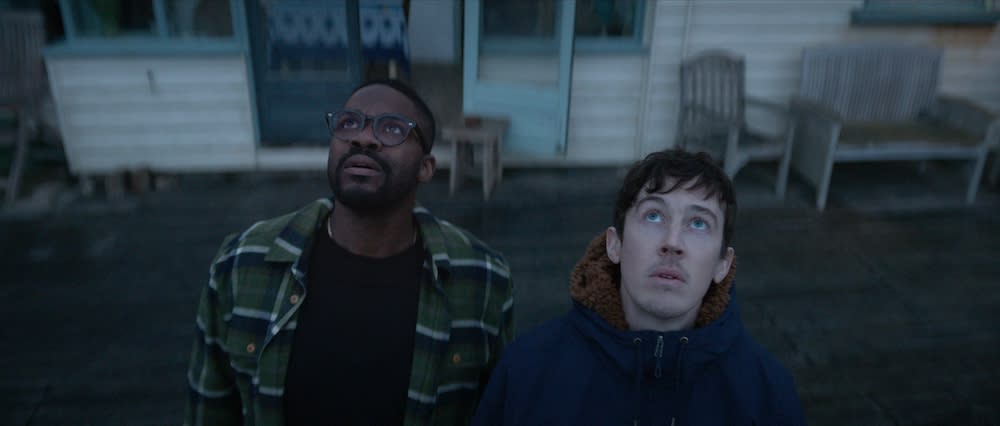‘3 Body Problem’ Review: David Benioff and D.B. Weiss’ Netflix Debut Is a Brutal Dud

- Oops!Something went wrong.Please try again later.
- Oops!Something went wrong.Please try again later.
Adapting a book named after a physics problem into a TV show meant to entertain the masses is both an admirable challenge and an invitation for disaster. Cixin Liu’s “Remembrance of Earth’s Past” trilogy (including its first entry, “The Three-Body Problem”) has sold millions of copies around the world. Clearly, readers are connecting with something inside the former engineer’s weighty tomes about Earth’s first encounter with extraterrestrial life — and it likely isn’t the orbital mechanics. The colossal scale, galaxy-spanning stakes, and relatable characters all serve as emotional anchors that can hook people, and they all serve as key, replicable facets for a TV adaptation, too. What’s a bit harder to picture are casual fans scooting to the front of their seats for detailed explanations of interstellar travel and multi-dimensional theory. But hey, that’s the gig. You can’t say David Benioff and D.B. Weiss went into “3 Body Problem” unaware.
The co-creators of HBO’s mega-hit “Game of Thrones” signed an overall deal with Netflix shortly after their song of ice and fire ended and, encouraged by their success in broadening the appeal of high fantasy, they decided to try the same for hard sci-fi. But after struggling through all eight episodes of the first season, their respectful effort is ultimately in vain. “3 Body Problem” is a sprawling drag, at turns disorienting in its use of inconsistent CGI to convey the story’s momentousness and aggravating in its approach to character development and existential quandaries. The plot is easy enough to track, but the relief of realizing you can keep up with this motley crew of scientist pals — as they try to figure out why so many of their peers are dying off — is short-lived. What’s left is frustration after frustration over how familiar the broader story becomes, how little you feel for those involved, and how brutal things get, both onscreen and off.
More from IndieWire
On 'SNL,' Scarlett Johansson's Katie Britt Turns Her State of the Union Response into a QVC Segment
'Azrael' Review: Samara Weaving Silently Runs for Her Life in a Feature-Length Chase Sequence
One of Benioff and Weiss’ biggest changes to the books (along with their co-showrunner Alexander Woo) is in rewriting nearly all of the main characters. The series revolves around a group initially referred to as “The Oxford Five”: Saul Durand (Jovan Adepo) is a nihilistic research assistant at a particle accelerator who prefers getting high and laid to pursuing anything of substance. That includes a relationship with Auggie Salazar (Eiza González), his on-again, off-again love interest who’s also his polar opposite in the field: Her dedication to helping others drove the woman described as “beautiful in a boring way” — “like a movie star from really bad movies” — to creating the “world’s finest neurofiber,” which is as “strong as steel” and invisible to the naked eye.
Auggie’s best friend is Jin Cheng (Jess Hong), a theoretical physicist easily obsessed with intricate challenges. She’s fawned over by Will Downing (Alex Sharp), a middle-school teacher with a devastating martyr complex that’s caused him to give up on his professional dreams, romantic aspirations, and pretty much anything that doesn’t involve silent pining. Rounding out The O.V. (O for Oxford, and V as in the roman numeral for five) is Will’s foil: Jack Rooney (John Bradley), yet another physicist, only his big invention is a highly profitable snack food company. (To emphasize his status as a scientist who sold out, Jack also dabbles in canned cocktails.)
Initially, a few matters trouble these students of matter: First, every particle accelerator on the planet is generating nonsensical results, and no one can figure out why. Saul’s boss is so flummoxed, she takes the impossible data points as a sign that God exists. Jin combs through the machines’ gibberish number by number, thinking she can spot the glitch. But others are more concerned with a second mystery: Scientists are dying. Some appear to be suicides, several indicate foul play, and more still make as much sense as the results spit out by the accelerators. Chaos reigns over the scientific community, and the bedlam is just beginning.

Keeping a close eye on the Oxford Five is Da Shi (Benedict Wong), an investigator hired by man-of-mystery Thomas Wade (Liam Cunningham) to see about these murders (see who’s doing it) and maybe keep it from happening to the surviving members deemed extra special by his rich-and-powerful boss. Da is a classic TV detective: determined to do the right thing, haunted by his own personal problems, yet quick to deliver a clever one-liner. There’s just not enough of him, which brings us to the character who dominates our story — and kicks it off.
In the 1960s, Ye Wenjie (Zine Tseng) is a science prodigy whose father is beaten to death in front her, her brother, and a roaring crowd during a spontaneous public execution. Her dad, a physics professor, dared to teach the big bang theory amid the Chinese Cultural Revolution, and calmly admitting as much sends his captors into a violent rage. Ye is left to watch as the blood dripping from his open wounds pours into his unblinking eyes, and the image shapes her life in an ugly, unenviable way the show comes to emulate.
Despite being viscerally upsetting and excessively callous, the first scene sets a pattern for the rest of “3 Body Problem.” Like the detailed staging of Tsinghua University circa 1966, there are plenty of unique set pieces peppered throughout the eight episodes. (But many of them take place in a VR-style “game” mysteriously gifted to members of the Oxford Five, which reads as a big empty room filled in with a few real people, a practical stage or two, and a whole lot of disaffecting CGI.) Like the guards’ sudden, inordinate outburst, the story lurches from one scene to the next, never finding a reliable rhythm and stranding characters without nuanced thoughts or relationships. (Solutions to supposedly impossible problems are found at lightning speed, especially in later episodes, as the season sets up its woefully underwhelming climax.) And like the pitiless blows lumped on the innocent physics professor, nearly every hopeful build-up orchestrated by our heroes ends in a catastrophic let-down that leaves you feeling cold, empty and, eventually, numb.
Without getting into spoilers (which, per Netflix, is virtually everything in the show), “3 Body Problem” works as an allegory for the climate crisis, posing questions like, “What’s the point of one single life when the world could be ending?” Yet it offers little more than literal answers that are specific to the narrative and unhelpful or uninteresting when applied to reality. The few times it does reach for something deeper, something soulful, the takeaways are either swathed in cynicism or so rudimentary they sound like clichés.
Critics of Benioff and Weiss will also note plenty of old issues popping up again. There are confounding changes to a beloved book series (I cannot imagine these new characters going over well), indelicate handling of racial and gender dynamics (the remaining Chinese characters in this once fully-Chinese story are barely developed, outright villainous, or both), and a disregard for grisly tropes like fridging. (What happens in Episode 8 is such a painful example of dismissing a female character to advance a male character’s arc, I’m surprised it’s not already on the Wiki page.)
Where “Game of Thrones” paired diabolical plots for power with astonishing action, “3 Body Problem” offers little personal intrigue to balance its increasingly unimpressive attempts at spectacle. It may not be fair to compare the two — they’re different genres with different origins and different goals — but whether it’s the shared creators and cast, or similar worldviews and barriers to entry, there’s a common thread linking the two series — and not one Netflix is hoping fans notice. Both are easy enough to track, but “3 Body’s” problem is it’s far too difficult to enjoy.
Grade: D+
“3 Body Problem” premiered at the 2024 SXSW Festival. Netflix will release all eight episodes of the first season Thursday, March 21.
Best of IndieWire
Sign up for Indiewire's Newsletter. For the latest news, follow us on Facebook, Twitter, and Instagram.

